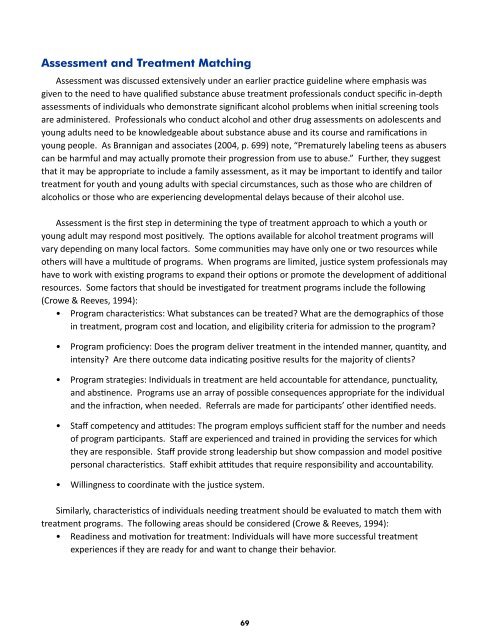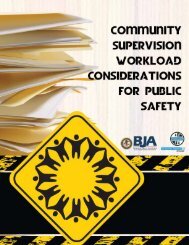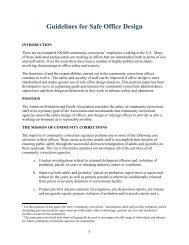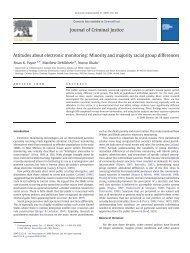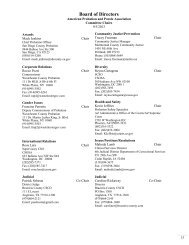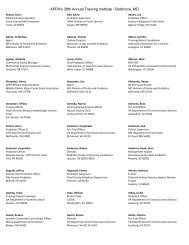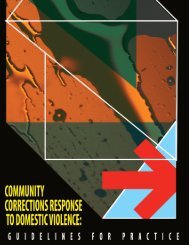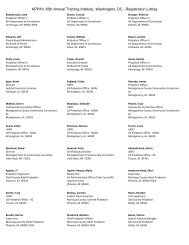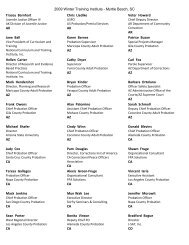Intervention Principles and Practice Guidelines for - Underage ...
Intervention Principles and Practice Guidelines for - Underage ...
Intervention Principles and Practice Guidelines for - Underage ...
You also want an ePaper? Increase the reach of your titles
YUMPU automatically turns print PDFs into web optimized ePapers that Google loves.
Assessment <strong>and</strong> Treatment Matching<br />
Assessment was discussed extensively under an earlier practice guideline where emphasis was<br />
given to the need to have qualified substance abuse treatment professionals conduct specific in-depth<br />
assessments of individuals who demonstrate significant alcohol problems when initial screening tools<br />
are administered. Professionals who conduct alcohol <strong>and</strong> other drug assessments on adolescents <strong>and</strong><br />
young adults need to be knowledgeable about substance abuse <strong>and</strong> its course <strong>and</strong> ramifications in<br />
young people. As Brannigan <strong>and</strong> associates (2004, p. 699) note, “Prematurely labeling teens as abusers<br />
can be harmful <strong>and</strong> may actually promote their progression from use to abuse.” Further, they suggest<br />
that it may be appropriate to include a family assessment, as it may be important to identify <strong>and</strong> tailor<br />
treatment <strong>for</strong> youth <strong>and</strong> young adults with special circumstances, such as those who are children of<br />
alcoholics or those who are experiencing developmental delays because of their alcohol use.<br />
Assessment is the first step in determining the type of treatment approach to which a youth or<br />
young adult may respond most positively. The options available <strong>for</strong> alcohol treatment programs will<br />
vary depending on many local factors. Some communities may have only one or two resources while<br />
others will have a multitude of programs. When programs are limited, justice system professionals may<br />
have to work with existing programs to exp<strong>and</strong> their options or promote the development of additional<br />
resources. Some factors that should be investigated <strong>for</strong> treatment programs include the following<br />
(Crowe & Reeves, 1994):<br />
• Program characteristics: What substances can be treated? What are the demographics of those<br />
in treatment, program cost <strong>and</strong> location, <strong>and</strong> eligibility criteria <strong>for</strong> admission to the program?<br />
• Program proficiency: Does the program deliver treatment in the intended manner, quantity, <strong>and</strong><br />
intensity? Are there outcome data indicating positive results <strong>for</strong> the majority of clients?<br />
• Program strategies: Individuals in treatment are held accountable <strong>for</strong> attendance, punctuality,<br />
<strong>and</strong> abstinence. Programs use an array of possible consequences appropriate <strong>for</strong> the individual<br />
<strong>and</strong> the infraction, when needed. Referrals are made <strong>for</strong> participants’ other identified needs.<br />
• Staff competency <strong>and</strong> attitudes: The program employs sufficient staff <strong>for</strong> the number <strong>and</strong> needs<br />
of program participants. Staff are experienced <strong>and</strong> trained in providing the services <strong>for</strong> which<br />
they are responsible. Staff provide strong leadership but show compassion <strong>and</strong> model positive<br />
personal characteristics. Staff exhibit attitudes that require responsibility <strong>and</strong> accountability.<br />
• Willingness to coordinate with the justice system.<br />
Similarly, characteristics of individuals needing treatment should be evaluated to match them with<br />
treatment programs. The following areas should be considered (Crowe & Reeves, 1994):<br />
• Readiness <strong>and</strong> motivation <strong>for</strong> treatment: Individuals will have more successful treatment<br />
experiences if they are ready <strong>for</strong> <strong>and</strong> want to change their behavior.<br />
69


